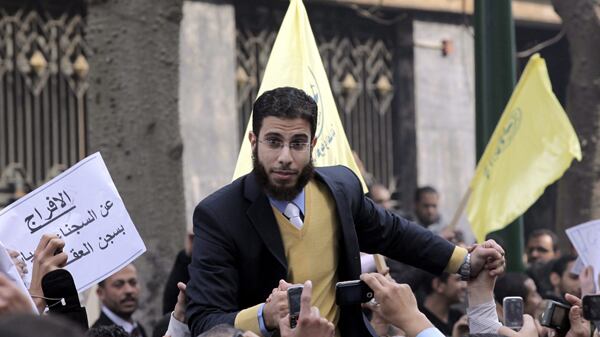Nader Bakkar sits down for interviews with the Western press like he’s preparing for a test. “I am ready for your quiz,” he said on a recent night as he took a seat in the lobby of the Cairo hotel that many young Salafist politicians call home.
Even by the standards of a political spokesman in Egypt’s young democracy, Bakkar has a trying job. He is the public face of al-Nour, the hardline Salafist party that muscled a surprise second-place showing in last year’s parliamentary elections and has been a powerful and controversial political force ever since. More recently, Bakkar was one of the men calling Egyptians out into the streets to protest the now-infamous anti-Islamic film made by a Coptic Christian living in California—a demonstration that turned violent after young men scaled the walls of the American embassy and hoisted a black Islamic flag in place of the Stars and Stripes. Demonstrators trying to push their way to the embassy then clashed with police for days.
Bakkar and his fellow Salafists were blamed by some for instigating the chaos, though they condemned the violence from the start. For Bakkar, who is often put in the difficult position of trying to explain the Nour party—and Egypt’s Salafists more generally—to the West, the embassy protests were perhaps the most trying example yet. “Stereotyping is a common thing, and Americans especially can be very ready to stereotype—to put all men with beard into one category,” he says, gesturing at his own long black beard. “The category of Osama bin Laden, for example. This is an easy way to deal with things.”
Salafists emphasize a strict adherence to the form of Islam that they believe the Prophet Mohammed and his contemporaries practiced. They are often regarded warily from the outside—and suspicion of them has grown in Egypt since the Nour party became a political force. Nour’s seats in the Egyptian parliament rank second only to the Freedom & Justice Party of the Muslim Brotherhood, the country’s more moderate Islamist front, whom they often seem to view as their primary political rivals.
When asked what kind of preconceptions he worries about, Bakkar responds: “That I am an extremist. That the Nour party are extremists.”

Young, dynamic, and smartly dressed in a blazer and jeans, Bakkar seems just the face the Nour party hopes to present as it settles into political relevance, both inside the country and out. At 28, he has a litany of accomplishments under his belt—a commerce degree from Alexandria University, a prominent project management job, columns in Egyptian newspapers. He’s also relatively libertarian in his religious views—previous bios of Bakkar have noted that his mother is a working woman, and that his fiancée, currently a pharmacy student, also plans to work one day, albeit in a niqab. (Bakkar says Muslim women shouldn’t be required to be veiled.)
Bakkar sees himself as a bridge builder—and many of the liberal activists who led the Jan. 25 movement, such as Ahmed Maher of the April 6 Movement, consider him to be a man with whom they can work. “He’s a good man,” Maher told The Daily Beast. “I feel like he’s the most decent of this group.”
But the crisis over the embassy protests put those bridges to the test. Bakkar’s was among the most prominent voices calling for the initial protest, and some were quick to blame him for the results. “This is all @naderbakkar’s fault,” one moderate tweeted. “He called for protests at the #US Embassy in #Egypt, shed light on that stupid movie and started all this,” tweeted blogger Ahmad Aggour.
When the U.S. Embassy got wind of the planned protest, they reportedly called Bakkar and asked him to call it off—but he said there was no turning back, according to the McClatchy news service. After the protests had deteriorated into mayhem, many Salafists could be seen in the midst of the clashes urging the agitators to go home, worried that their message was being lost in the violence. Bakkar echoed this sentiment, appearing regularly on television calling for an end to the mob scene, but to no avail.
The criticism of Bakkar and his fellow Salafists was echoed by members of the Muslim Brotherhood, who accused them of fanning the flames of public rage that quickly spread beyond their grasp. “The problem is they basically created this target for where this angry mob can direct its anger. And they started it without being able to control it,” Gehad el-Haddad, Bakkar’s young counterpart on the Brotherhood’s side, told The Daily Beast as the clashes raged.
Bakkar dismisses the idea that the Salafists were to blame. “The Salafists don’t need to teach people to be angry for the prophet, peace be upon him,” he says. “Either way people were going to go out to protest.”
At the same time, he has seized the moment to intensify calls for an anti-blasphemy law in Egypt’s constitution, a piece of legislation he said that the Nour party would push “especially after what happened” with the film, as he told The Christian Science Monitor. He has also said that people who insult prophets (not just the Muslim one) should have their citizenship revoked.
Bakkar says that the protests were a telling example of the difficult balancing act involved in his job. “I was out there saying that the American Embassy is American land,” and people shouldn’t violate it,” he says. “People didn’t understand that. They attacked me personally—‘How can you say that?’
“At the same time,” he continues, “we had to make clear that the assault on the Prophet, peace be upon him, is a terrible thing. So it’s trying to clarify for both sides.”
And he says he hopes that job will become easier with time. “I’m talking about a new world, a post–Arab Spring world, where everyone can sit at the same table, even if they’re ideologically opposed.”






